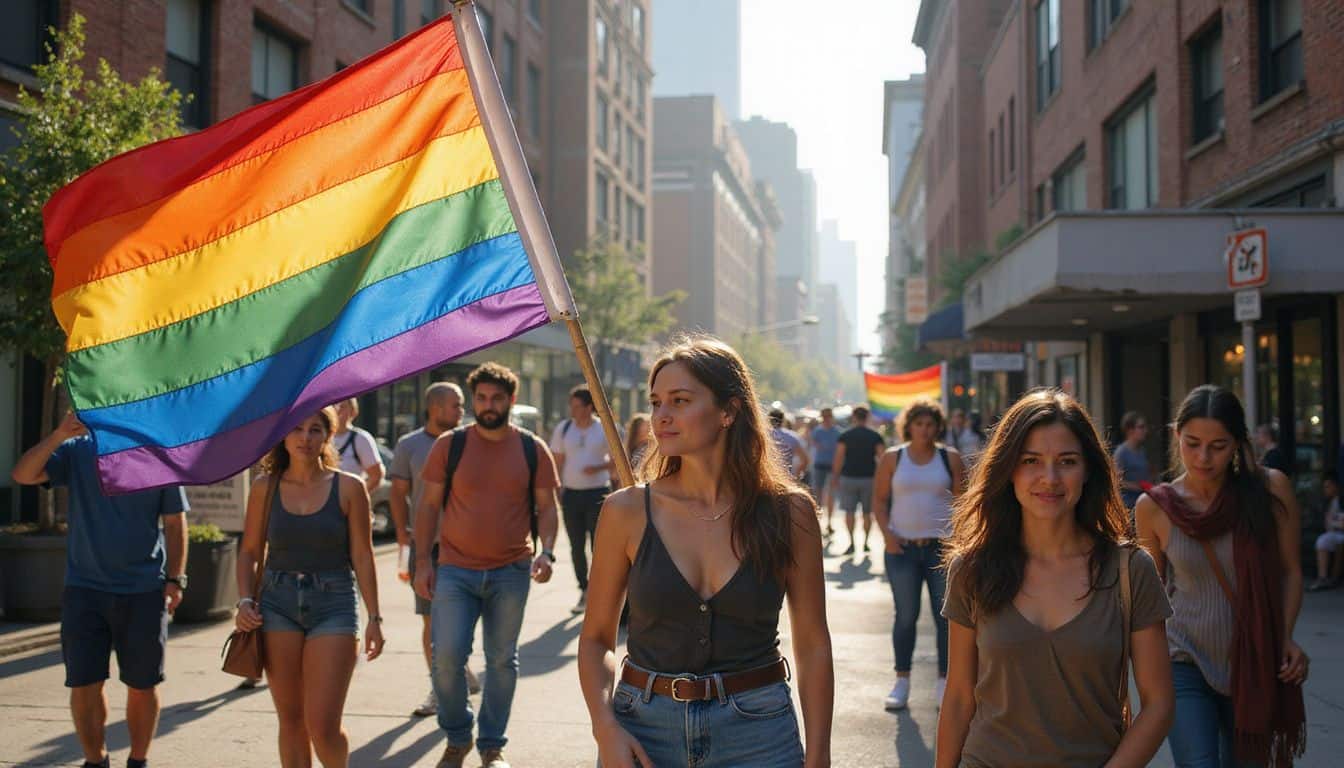Many women find it hard to talk openly with their partner about sex taboo topics, leading them to feel alone or unhappy. Yet research shows couples who discuss sexual preferences without judgment often report higher trust and closeness.
This post will show you five simple ways talking more freely about sex taboos can make your relationship stronger and healthier. Keep reading—you deserve a happier love life!
Key Takeaways
Couples who openly discuss sexual topics often build stronger trust and deeper connections—while those who keep quiet frequently feel lonely and dissatisfied.
Sexual taboos vary greatly from culture to culture; Nordic nations typically adopt open attitudes, while Middle Eastern countries tend to enforce stricter standards shaped by religious traditions.
Many women struggle with shame around their sexuality; this shame can create emotional barriers in relationships, leading over time to anxiety, guilt, and even depression.
Modern society continues to grow more accepting of different sexual identities and lifestyles, thanks especially to popular TV shows and social media breaking traditional barriers.
By 2025, experts foresee clearer conversations about intimacy, better sexual education programs, and stronger legal protections for LGBTQ+ communities—all helping to lower sexual stigma even further.
Table of Contents
Understanding Sexual Taboos

Sexual taboos shape our views on what’s right or wrong in the bedroom. These unspoken rules differ across societies and can limit our sexual growth and connection with partners.
Definition of sex taboos

Sexual taboos are behaviors or desires society views as wrong, strange, or unacceptable. These forbidden acts differ widely between cultures—but often involve subjects like anal intercourse, BDSM, or open relationships.
The word “taboo” itself originates from the Tongan term “tabu”, meaning something forbidden, cursed, or off-limits.
Societies create taboos mostly to maintain social order, reflecting their views of morality and proper conduct. Breaking such rules can have serious consequences—you might face social rejection, legal problems, or even personal feelings of guilt over your choices or fantasies.
Many sexual taboos originally began with ancient religious doctrines or cultural traditions. Yet today, these beliefs often seem outdated and clash with modern views on sexual freedom and consent.
People interested in fantasies like bratty sis content often explore these boundaries safely, within imaginary scenarios and private spaces.
Examples of common sexual taboos across cultures
Cultural attitudes shape the limits around sex, affecting what different societies see as shameful or off-limits. Here’s a quick look at common sexual taboos in various parts of the globe:
- Many Middle Eastern countries strictly ban homosexuality, with harsh punishments under Islamic law—including death by stoning in extreme cases.
- Extramarital sex violates serious social standards in nations like Saudi Arabia and the Philippines, leading to potential legal penalties.
- Oral sex still carries strong stigma among more conservative traditional communities, even though it’s widely accepted in Western countries.
- Wearing clothing typically worn by the opposite sex can land people in jail in Brunei and Indonesia, where cross-dressing remains illegal.
- Period sex faces deep-rooted social taboos in multiple cultures; some societies label menstruating women as unclean or impure.
- Masturbation encounters negative judgment from religious communities, who label it a harmful or sinful practice.
- Anal sex is outlawed in countries enforcing anti-sodomy laws; attitudes, though, continue shifting in Western cultures.
- BDSM activities—like bondage, dominance, and submission—often draw criticism and disapproval, despite being legal between consenting adults in many regions.
- Polyamory relationships challenge monogamy norms, facing widespread social rejection worldwide.
- Pornography regulation differs significantly between countries; some fully ban it, others strictly control its distribution and use.
- Fantasies involving forbidden topics can stir guilt or shame, even if the thoughts never become actions.
- Open relationships and consensual non-monogamy struggle against pushback from cultures strongly favoring exclusive partnerships.
The Role of Cultural and Religious Norms

Cultural norms shape our views on sex through family values, media messages, and social rules. Religious teachings add another layer, often setting strict boundaries on what sexual acts are allowed or forbidden.
Influence of societal values on sexual taboos

Society has a big say in how we think about sex—often quietly through unwritten rules. These social norms stem from family traditions, religious teachings, and local customs, defining certain acts as acceptable and labeling others as taboo.
For instance, topics like masturbation or same-sex relationships might face severe judgment in one place. Elsewhere, these might be openly accepted, yet polyamorous lifestyles or BDSM practices still draw criticism.
Such norms strongly influence our laws, healthcare access, and even what’s included in sexual education classes.
Attitudes toward sexual matters vary widely from region to region. Western nations generally have more openness about sexual pleasure and different sexual identities, while some areas under strict Islamic law still execute people accused of adultery.
Across the globe, women typically face stricter rules than men regarding sexuality. This uneven standard limits honest talks about intimacy and creates barriers to essential sexual health resources.
Stigmas surrounding personal desires often lead people to hide their true feelings, causing shame that hurts both relationships and emotional wellness.
Variations in taboos across different regions

Sexual boundaries vary widely around the globe, shaped by culture, religion, and local traditions. What’s common in one area could easily shock those living elsewhere. Consider these regional examples:
- In Nordic regions like Sweden, attitudes toward sex are noticeably open. People discuss intimacy freely, accepting diverse sexual expressions without judgment.
- Middle Eastern countries typically follow strict guidelines influenced by Islamic traditions. Sexual activities usually occur only within marriage, and laws punish certain sexual behaviors severely.
- Japan features a unique blend of old and new ideas about sexuality—which can seem contradictory at times. Explicit media content is common, yet candid discussions about personal sexual lives remain rare.
- Across Latin America, Catholic teachings mix with shifting social expectations. Younger generations openly discuss topics like masturbation and same-sex relationships, while older populations often resist such conversations.
- In America, attitudes regarding sexuality vary widely by region. Coastal urban areas tend to openly support LGBTQ+ identities and non-traditional relationships, while rural communities remain more conservative.
- Across African countries, beliefs about sexuality depend largely on tribal traditions and colonial legacies. Some groups uphold traditional customs, and others adopt more international ways of thinking about sexual behavior.
- India presents an interesting contrast: despite ancient texts such as the Kama Sutra openly addressing sexuality, public displays of affection are still often avoided in many parts of the country. This highlights shifting views within the same society over generations.
- Australia and New Zealand maintain generally open-minded attitudes, similar to Europe. Recently, acceptance for transgender individuals and diverse orientations has continued to broaden noticeably throughout these nations.
- Social media has brought global sexual taboos into everyday conversations. Young women especially are now openly discussing experiences and preferences online, conversations previously considered too private or inappropriate for public forums.
Psychological and Emotional Impact of Sex Taboos

Sex taboos create deep emotional wounds that can last for years, causing shame, guilt, and fear in relationships. These hidden scars often block true intimacy and prevent couples from expressing their real desires and needs to each other.
Effects on personal relationships

Sex taboos often build walls between partners, blocking open communication. Many women admit they feel shame about their sexual desires, which can lead to strained conversations with their significant others.
This silence creates tension and distance within a couple. Recent studies confirm women who hold more reserved views about casual sex typically experience stronger negative feelings afterward.
Over time, these emotions evolve into regret and ongoing dissatisfaction.
Breaking through these barriers begins by speaking openly about sexual closeness and intimacy. I experienced firsthand how having the sex talk with my partner transformed our connection—honestly, it changed everything.
Sexual moments become more rewarding if both individuals feel safe expressing their desires. Data supports this approach, showing that positive emotional responses to intimacy can significantly improve relationship health.
Couples who openly express their wishes, limits, and fantasies create deeper connections built on honesty, not anxiety or fear.
Internalized shame and its consequences

Sexual shame can quietly affect our mental health, leaving lasting emotional scars. Many women face deep anxiety, guilt, or depression because society labels certain sexual thoughts or desires as unacceptable.
Instead of opening up honestly to partners, these negative feelings often push people into harmful sexual behaviors. I’ve personally watched close friends silently struggle, keeping their true desires hidden—even within strong, loving relationships.
Freedom begins when we learn to separate who we are from the shame we’ve been taught to feel.
Breaking free of shame about sex gives room for honest conversations and real intimacy. Exploring personal desires openly with a trusted partner can ease these harmful feelings and build stronger bonds.
The LGBTQ+ community has long challenged social standards that fuel shame, showing how openness about sexuality leads to healthier, happier relationships. Women who accept and embrace their sexual feelings without judgment often experience greater happiness in their relationships and everyday lives.
Challenging and Reevaluating Sexual Taboos

Modern couples now question old sexual rules that once limited their pleasure and connection. Many people find freedom and deeper bonds when they talk openly about desires that society once labeled as wrong or strange.
Shifting perceptions in modern society

Society has grown much more open about sexual topics recently. People now openly discuss sexual orientation, fantasies, and relationship models like polyamory. Social media and pop culture play a big role in breaking old taboos.
Popular TV series regularly portray same-sex relationships, BDSM groups, and intimate talks that once stayed secret. I’ve noticed my friends seem more relaxed, sharing their personal experiences without embarrassment.
This openness creates safe, supportive spaces for people to honestly express their desires.
Cultures worldwide increasingly recognize the need to revise outdated social attitudes about sexuality. Greater respect for transgender individuals and people identifying as pansexual, bisexual, or asexual highlights this shift.
Dating apps today feature multiple identity choices beyond the traditional options of straight or gay, giving users room to showcase diverse preferences. Fetishes, previously labeled deviant, now appear as healthy and natural aspects of human sexuality.
This acceptance encourages people to show themselves compassion, embracing their genuine wishes openly. The next phase could involve seeking expert advice, taking these important conversations even further forward.
Advocacy for open conversations about taboo topics

Opening up about sexual taboos builds stronger bonds between partners—and yet, many couples stay quiet. Lots of people avoid sensitive topics like fantasies or power roles, scared they’ll be judged or misunderstood.
Breaking that silence can boost trust and deepen your bond, helping you both feel closer. Groups today even create safe spaces where people comfortably share honest thoughts about intimacy.
These discussions help people overcome shame about desires that are totally normal.
Open communication doesn’t stop at romantic relationships—it includes friends and family, as well. People who openly discuss sensitive subjects say they feel more understood, accepted, and connected.
Researcher Justin Lehmiller found talking honestly about private sexual thoughts can reduce inner shame and anxiety. Couples who clearly express their desires tend to have happier, more satisfying relationships.
Staying curious and using straightforward but gentle language helps make these tough conversations easier and more productive. If you’d like tips on comfort, boundaries, and making these conversations smoother, check out brother sister massage.
How Will Perspectives on Sexual Taboos Evolve in 2025?

Sexual taboos will likely change significantly by 2025, thanks to growing LGBTQ+ visibility in media and politics. More people will openly talk about sexual intimacy and personal experiences without embarrassment or shame.
Better and more inclusive sex education will help younger people develop healthier attitudes about topics traditionally seen as off-limits. Many women may feel more comfortable exploring desires through masturbation, experimenting with roleplay ideas, or discussing power dynamics openly with their partners.
Legal advancements in LGBTQ+ rights will also reshape social norms about who can openly express sexuality—and how they choose to do so. Increasing awareness around mental health topics will encourage greater acceptance for transgender people and polyamorous relationships.
Virtual sex and augmented reality might even open brand-new spaces for intimate exploration, free from stigma and judgment. Women identifying as demisexual, aromantic, or ethically non-monogamous will also discover more understanding and supportive communities, both online and in real life.
People Also Ask
How can talking about sexual fantasies improve my relationship?
Opening up about sexual fantasies creates trust and closeness. Honest conversation about what excites each partner fosters stronger emotional bonds. It also leads partners to understand each other’s desires clearly, often improving sexual satisfaction.
Is it normal for couples to have different comfort levels with sexual activity?
Yes, completely normal. Each person has their unique desires, pace, and boundaries. Some might enjoy exploring kink or BDSM scenes, while others lean toward more classic sexual activities. Patience, understanding, and respect for these differences help partners feel secure and appreciated.
How can couples overcome societal norms about sex?
Couples can set their own guidelines, deciding what fits their relationship best—without worrying about society’s views. Reading openly about sexuality, talking with a counselor, or learning from other people’s experiences can help shake off any embarrassment or shame. What consenting adults do privately belongs to them alone, not to society.
What role does consent play in exploring new sex acts?
Consent forms the heart and soul of any healthy sexual encounter. Partners must both clearly and openly agree before trying out new sexual activities. Safe words, specifically chosen together, ensure everyone feels comfortable and secure, especially during kink exploration or trying new types of intimacy.
Can technology help couples explore sexuality?
Technology can give couples exciting opportunities to connect sexually. Virtual reality (VR), augmented reality (AR), or even adult content can open the door for couples to explore together safely. Toys like vibrators, dildos, or strap-ons might also inspire new conversations about desires or boundaries.
How important is it to discuss orgasm with my partner?
Discussing orgasm openly is a vital part of sexual pleasure and fulfillment. Many partners miss out on satisfaction by not sharing exactly what helps them climax. A straightforward, comfortable talk about preferences, whether related to penetration, oral, or manual stimulation, helps create better understanding and enjoyment for both partners.
References
https://library.fiveable.me/key-terms/introduction-cultural-anthropology/sexual-taboos
https://pmc.ncbi.nlm.nih.gov/articles/PMC11319820/
https://www.yourdictionary.com/articles/examples-taboos-worldwide
https://www.issm.info/sexual-health-qa/how-do-cultural-or-societal-factors-impact-sexual-health
https://pmc.ncbi.nlm.nih.gov/articles/PMC8579856/
https://www.jsr.org/hs/index.php/path/article/view/6355 (2024-02-29)
https://www.jsr.org/hs/index.php/path/article/download/6355/2957/43336
https://www.eurekalert.org/news-releases/546175
https://pmc.ncbi.nlm.nih.gov/articles/PMC2703209/
https://medium.com/@avas3/10-reasons-why-sexual-norms-could-evolve-by-2025-3cdf6cd3b31a
